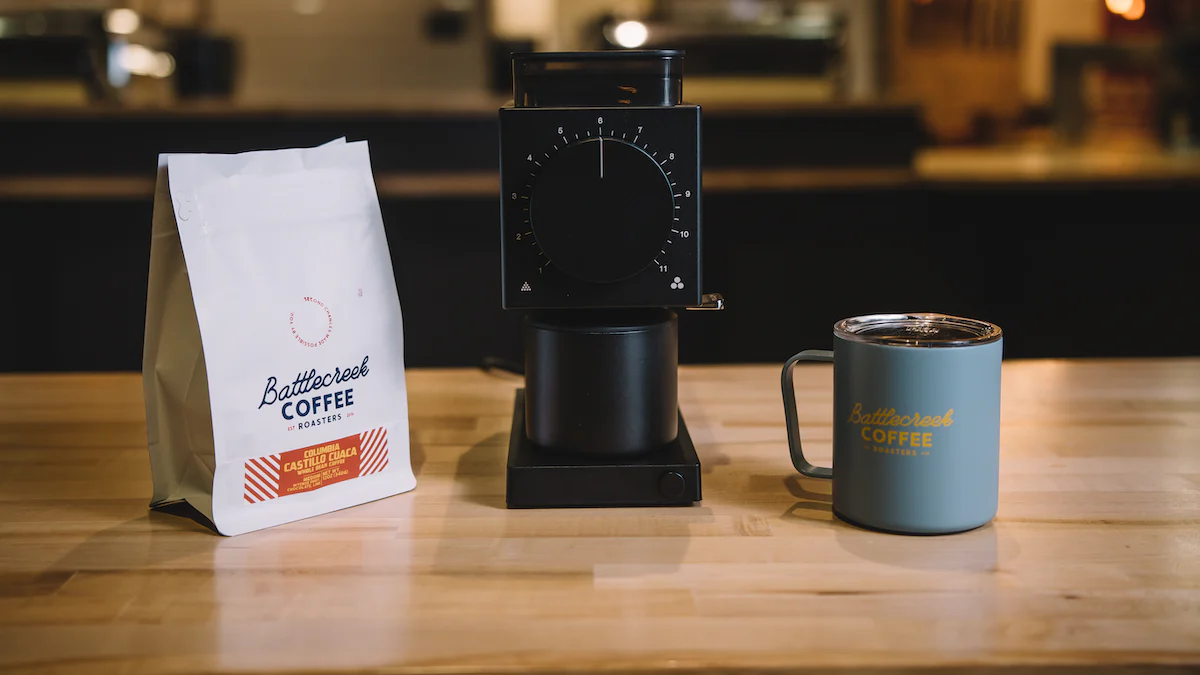FTC/ASA Disclosure: Some links in this post are affiliate links. At no additional cost to you, I will earn commission if you purchase via my links. Thank you in advance for your support! 🙏 It means a lot to me. ❤️
Introduction
Coffee is more than just a beverage; it is a fascinating part of human history and culture. Originating in Ethiopia, coffee has spread its influence across the world, becoming an integral part of daily life for millions of people. In this blog post, we will embark on a journey through coffee's rich history, exploring its origins and tracing its path to becoming a global phenomenon. From the birth of coffee culture to the social and cultural significance of this beloved drink in different regions, we will uncover the captivating story behind one of the world's most popular beverages. So grab your favorite mug and join us as we unveil the origins of coffee and delve into its remarkable history.
The Origins of Coffee
Coffee, as we know it today, has its roots in the ancient land of Ethiopia. It is believed that coffee was first discovered in the 9th century in the region known as Kaffa, which is now part of modern-day Ethiopia. Legend has it that a goat herder named Kaldi noticed his goats becoming energized and lively after consuming the red berries from a certain tree. Intrigued by this phenomenon, he decided to try the berries himself and experienced a burst of energy.
This tale of Kaldi and his dancing goats has become an integral part of coffee folklore, symbolizing the serendipitous discovery of this beloved beverage. The early cultivation and consumption of coffee in Ethiopia were closely tied to religious ceremonies and rituals. Coffee beans were roasted, ground, and brewed into a drink that was enjoyed during communal gatherings.
From Ethiopia, coffee made its way to the Arabian Peninsula through trade routes. By the 15th century, coffee had become popular in Yemen, where it was cultivated on a larger scale. It was in Yemen that the first known coffee houses emerged. These establishments quickly became social hubs where people gathered to drink coffee, engage in intellectual discussions, play games, and listen to music.
The introduction of coffee to Europe and the Americas came much later. In the 17th century, European travelers brought back stories and samples of this exotic beverage from their journeys to the Middle East. Coffee quickly gained popularity among European aristocrats and intellectuals who frequented coffee houses for lively debates and discussions.
In the Americas, coffee arrived with European colonizers. The favorable climate conditions in countries like Brazil made it an ideal location for large-scale coffee production. Today, Brazil is one of the largest producers and exporters of coffee worldwide.
The journey from Ethiopia to Arabia and beyond marked the beginning of coffee's global expansion. Its cultural significance grew as it spread across different regions, shaping the way people socialize, work, and enjoy their daily lives.
The Birth of Coffee Culture
As coffee spread across the world, it gave rise to a vibrant coffee culture that transcended borders and became deeply ingrained in society. One of the key catalysts for this cultural phenomenon was the emergence of coffee houses.
The Rise of Coffee Houses
Coffee houses quickly became more than just places to enjoy a cup of coffee; they evolved into social hubs where people from all walks of life would gather to engage in lively conversations and intellectual exchanges. These establishments provided a space for individuals to discuss politics, literature, philosophy, and other topics of interest. Coffee houses became known as "penny universities" because for the price of a cup of coffee, one could partake in stimulating discussions and gain knowledge.
The impact of coffee houses on literature and art cannot be overstated. Many famous writers and artists found inspiration within the walls of these establishments. Writers such as Voltaire, Balzac, and Rousseau frequented coffee houses, using them as their creative sanctuaries. It was in these bustling environments that ideas were exchanged, collaborations were formed, and literary movements were born.
Coffee as a Global Phenomenon
Coffee's popularity transcended cultural boundaries and became a global phenomenon. It is enjoyed in various forms across different cultures, from strong espresso shots in Italy to sweetened iced coffees in Southeast Asia. Coffee has become an integral part of social gatherings and rituals around the world.
In many cultures, offering someone a cup of coffee is seen as an act of hospitality and friendship. Sharing a cup of coffee has become synonymous with building relationships and connecting with others on a deeper level. Whether it's enjoying a traditional Ethiopian coffee ceremony or sipping espresso at an Italian café, the act of sharing this beverage brings people together.
Coffee has also influenced daily life and routines in profound ways. For many people, starting the day with a cup of coffee is an essential part of their morning ritual. It provides a much-needed boost of energy and sets the tone for the day ahead. Coffee breaks have become a common practice in workplaces, allowing individuals to recharge and socialize with colleagues.
The birth of coffee culture marked a significant shift in how people interacted and connected with one another. Coffee houses became the breeding grounds for ideas, creativity, and cultural exchange. Today, coffee continues to be a symbol of community, friendship, and shared experiences across the globe.
Evolution of Coffee Brewing Methods
The way we brew coffee has evolved significantly over time, from traditional methods to modern innovations. This evolution has been driven by a desire to extract the best flavors and aromas from coffee beans, resulting in a diverse range of brewing techniques.
From Traditional Brews to Modern Innovations
Traditional methods of brewing coffee vary across different cultures. In Ethiopia, the birthplace of coffee, the traditional method involves roasting the beans over an open fire, grinding them by hand, and then steeping them in hot water. This produces a rich and full-bodied cup of coffee with distinct flavors.
In the 19th century, the invention of the coffee filter revolutionized brewing methods. The use of paper filters allowed for a cleaner and smoother cup of coffee. Drip brewing became popular, where hot water is poured over ground coffee in a filter, allowing it to slowly drip into a pot or carafe.
The rise of espresso in the 20th century brought about another wave of innovation in coffee brewing. Espresso machines use pressure to force hot water through finely ground coffee, resulting in a concentrated and intense shot of espresso. This method opened up new possibilities for creating specialty coffees like cappuccinos, lattes, and macchiatos.
The Art of Coffee Brewing
Brewing coffee is not just about following a recipe; it is an art form that requires skill and craftsmanship. Baristas play a crucial role in this process as they carefully select and grind beans, adjust variables such as water temperature and extraction time, and create visually stunning latte art.
The pursuit of the perfect cup of coffee has become an obsession for many enthusiasts. It involves experimenting with different brewing methods, ratios, grind sizes, and water temperatures to achieve the desired flavor profile. Specialty coffee shops have emerged as destinations for those seeking meticulously brewed cups using pour-over methods like Chemex or V60.
Coffee brewing has become a sensory experience, with each step contributing to the final result. The aroma of freshly ground beans, the sound of water pouring over coffee grounds, and the taste of a well-crafted cup all contribute to the enjoyment of this beloved beverage.
As coffee continues to evolve, so too will the methods and techniques used to brew it. From traditional brews rooted in history to modern innovations driven by technology, the art of coffee brewing will continue to captivate enthusiasts and delight coffee lovers around the world.
The Social and Cultural Significance of Coffee
Coffee holds a special place in social and cultural contexts, symbolizing hospitality, productivity, and creativity. Its presence is deeply ingrained in various customs and traditions around the world.
Coffee as a Symbol of Hospitality
In many cultures, offering a cup of coffee is an act of warm hospitality and a way to welcome guests into one's home. Sharing coffee with others creates a sense of connection and fosters relationships. Cultural customs surrounding coffee hospitality vary widely, from the elaborate Ethiopian coffee ceremony to the simple act of serving a cup of coffee to visitors.
Coffee also carries symbolic meanings in different societies. In some cultures, it represents friendship, trust, and goodwill. In others, it may be seen as a sign of respect or gratitude. The rituals associated with serving and drinking coffee often reflect these cultural values.
Coffee's Influence on Work and Productivity
Coffee has long been associated with increased productivity and focus. Many people rely on their morning cup of coffee to kickstart their day and enhance their mental alertness. The caffeine in coffee acts as a stimulant that can improve cognitive function and help individuals stay focused on tasks.
Coffee breaks have become an integral part of work culture in many countries. Taking short breaks to enjoy a cup of coffee not only provides physical refreshment but also serves as an opportunity for social interaction among colleagues. These breaks can foster collaboration, boost morale, and create a sense of camaraderie within the workplace.
Moreover, coffee has been linked to creativity and intellectual pursuits. Many writers, artists, and thinkers throughout history have turned to coffee as a source of inspiration during their creative processes. It is believed that the stimulating effects of caffeine can enhance cognitive flexibility and promote innovative thinking.
The social and cultural significance of coffee extends beyond its role as a beverage; it has become intertwined with daily life rituals, expressions of hospitality, work culture dynamics, and creative endeavors. Coffee's ability to bring people together, stimulate productivity, and inspire creativity has solidified its place as a beloved and influential aspect of society.
Coffee Rituals: A Window into Different Cultures
Coffee rituals provide a fascinating glimpse into the diverse cultures and traditions around the world. From elaborate ceremonies to daily routines, coffee holds a special place in many societies.
Traditional Coffee Ceremonies
Different cultures have their own unique coffee rituals that are steeped in tradition and symbolism. One notable example is the Ethiopian coffee ceremony, which is a significant part of Ethiopian culture. The ceremony involves roasting fresh coffee beans, grinding them by hand, and brewing them in a traditional clay pot called a jebena. The process is accompanied by the aroma of incense and serves as a symbol of hospitality and community bonding.
In Japan, there is a long-standing tea ceremony tradition known as chanoyu. While tea is the focal point of this ceremony, coffee has also found its place in modern adaptations. Some Japanese tea houses now offer coffee alongside traditional tea offerings, creating a fusion of cultural practices.
Coffee in Daily Life
Beyond formal ceremonies, coffee plays an integral role in daily life for many people around the world. Morning rituals often involve starting the day with a cup of coffee to awaken the senses and prepare for the day ahead. In some cultures, such as Italy or France, enjoying an espresso at a local café is an essential part of daily routine and social interaction.
Coffee also acts as a cultural symbol and expression. In certain countries like Turkey or Greece, serving strong black coffee without sugar signifies strength and resilience. In contrast, other cultures may prefer sweeter or milk-based variations that reflect their taste preferences.
Whether it's participating in traditional ceremonies or incorporating coffee into everyday routines, these rituals showcase how deeply ingrained coffee has become in various cultures worldwide. They highlight the significance of this beloved beverage beyond its taste alone – it represents connection, hospitality, tradition, and personal expression within different communities across the globe.
Conclusion
Coffee's journey from its origins in Ethiopia to becoming a global phenomenon is a testament to its enduring appeal and cultural significance. It has transcended borders and become deeply ingrained in societies around the world. The rich history of coffee, coupled with the diverse rituals and traditions associated with it, showcases the deep connection between this beloved beverage and human culture. From the Ethiopian coffee ceremony to the rise of coffee houses, from morning rituals to social gatherings, coffee has woven itself into the fabric of daily life. Its aroma, taste, and social nature continue to captivate coffee enthusiasts and bring people together across continents.
Brewhilda.com is a participant in the Amazon Services LLC Associates Program, an affiliate advertising program designed to provide a means for sites to earn advertising fees by advertising and linking to Amazon.com.










